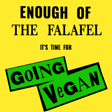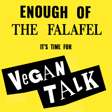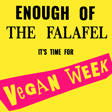
216- Joey Carbstrong vs the dairy farms of Cornwall
Go on Joey! Our top story is the investigation that has hit multiple news outlet headlines this week; shocking routine farming practices leading to suppliers being suspended. Dominic, Carlos & Anthony discuss this, & seven other stories from the week's vegan & animal rights news across the world.
****************
Enough of the Falafel is a community of people who love keeping on top of the latest news in the world of veganism & animal rights. With the Vegan Week podcast, we aim to keep listeners (& ourselves) informed & up-to-date with the latest developments that affect vegans & non-human animals; giving insight, whilst staying balanced; remaining true to our vegan ethics, whilst constantly seeking to grow & develop.
Each week we look through news stories from the past 7 days in the world of veganism & animal rights.
If you spot any news stories that might catch our fancy, or have an idea for a discussion topic, get in touch via enoughofthefalafel@gmail.com.
*******************
This week's stories:
https://www.cornwalllive.com/news/cornwall-news/defra-probe-over-animal-cruelty-10593145
https://plantbasednews.org/culture/tv-and-radio/masterchef-runner-up-first-vegan-finalist/ (happened at the end of sept, but worth featuring i think?))
https://www.michiganpublic.org/criminal-justice-legal-system/2025-10-21/animal-rights-group-plans-supreme-court-appeal-over-rights-of-chimps-in-up-zoo
https://www.countytimes.co.uk/news/25560999.powys-b-b-bear-set-rebrand-vegan-retreat/
https://indianexpress.com/article/cities/chandigarh/dont-sacrifice-owls-on-diwali-punjab-animal-rights-activist-makes-an-appeal-10317183/
https://www.foodingredientsfirst.com/news/chile-octopus-farming-ban-bill.html
https://www.veganfoodandliving.com/news/food-not-feed-report/
https://plantbasednews.org/news/environment/updated-eat-lancet-planetary-health-diet/ -
****************
Thanks everyone for listening; give us a rating and drop us a message to say "hi"; it'll make our day!
Dominic, Carlos & Ant


